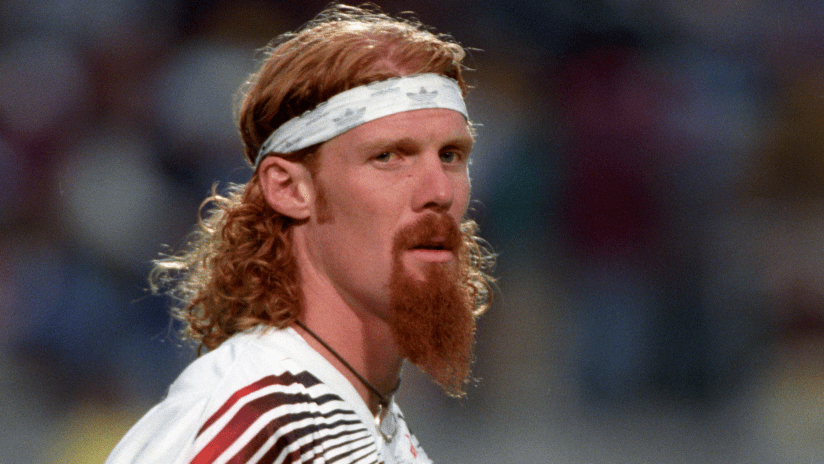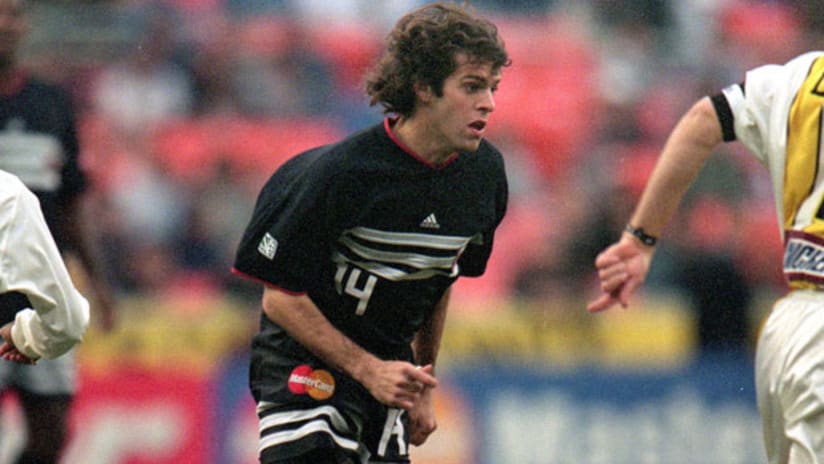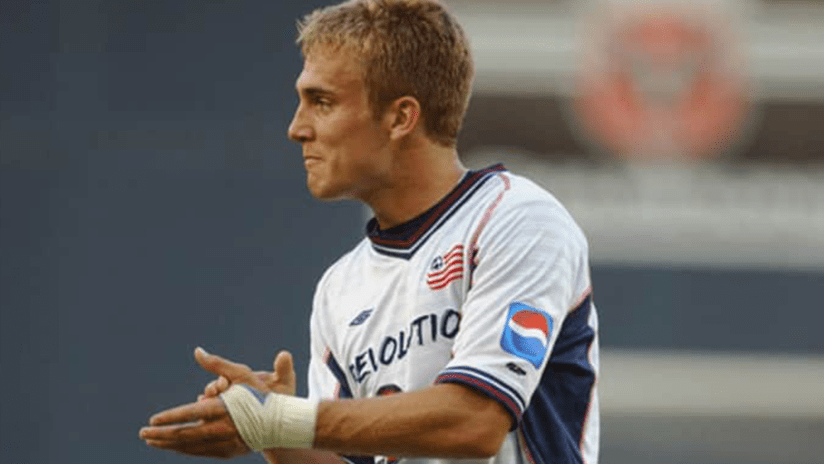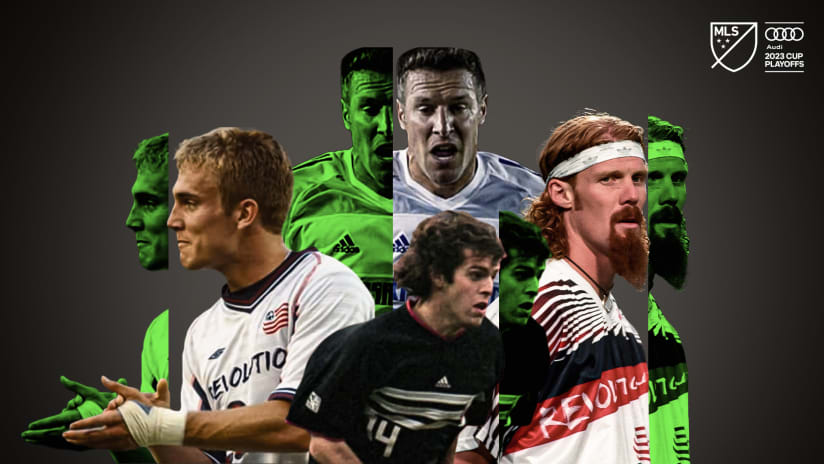Tony Meola was gutted.
It was Oct. 3, 2000, deep into that year’s MLS Cup Playoffs, and the Kansas City Wizards’ goalkeeper had just conceded a goal at the Rose Bowl in highly painful circumstances: An extra-time winner from the LA Galaxy’s Danny Califf which broke a 1-1 deadlock in the second leg of their semifinal series.
“And all I think about,” recalled Meola to MLSsoccer.com this week, “is OK, we got another chance.”
In most top-flight leagues around the world, the Wizards (who nowadays go by Sporting KC) would have been cooked. They’d only drawn the Galaxy 0-0 in the first leg at their Arrowhead Stadium home, so under the common two-legged goal-aggregate format, LA would’ve advanced to MLS Cup at RFK Stadium in Washington, D.C.
“If you only did two games at that time, just like the footballing world is pretty much used to, we would have been done at that point,” added Meola. “So that sticks out.”
Things worked differently in the first seven years of Major League Soccer. This was a three-game series, where the goal was “first to five,” meaning two wins (six points) or a win and two draws, and the higher-seeded Wiz got to host the first and third legs.
Anchored by one of the best defenses in league history, KC would hold serve back home, winning 1-0 in game three via a penalty kick converted by cult hero Miklos Molnar, then winning the tie-breaking, sudden-death “mini game” that followed via another Molnar strike. The Wizards would go on to win MLS Cup 2000, with Meola winning the league's MVP, Goalkeeper and Comeback Player of the Year awards, while his KC colleagues Peter Vermes and Bob Gansler won Defender and Coach of the Year honors, respectively.
Return to roots
Back then MLS hewed more closely to US and Canadian sporting norms than those of the soccer world. 2000 marked the first year in which draws were allowed, with deadlocked matches having been decided via shootouts – those of the ‘NASL style’ 35-yard variety, rather than spot kicks – in the league’s first four seasons. MLS had only just adopted the international game’s running, upward-counting clock the previous year, which also marked the debut of its first-ever soccer-specific venue, Columbus Crew Stadium.
So the postseason series format generally took after baseball, basketball and hockey more than global soccer, seeking to stoke interest and competitiveness over a sample size of three rather than just one or two games. As with many other aspects of MLS, the concept was tweaked repeatedly as the fledgling competition scratched and clawed for survival, and eventually it was ditched altogether after the 2002 season in favor of a hybrid of two-legged ties in the conference semifinal rounds and one-game conference finals.
Few could have guessed at that point that two decades later, the league would revisit the three-game series, dusting off the format for Round One of this year’s Audi MLS Cup Playoffs. But sure enough, it’s back, just like the baggy fits and bright colors of the 1990s have grown fashionable again.
“If you live long enough, everything will become, I guess, either cool or at the very least attempted again, right?” mused Alexi Lalas, who experienced the three-game series with the New England Revolution, MetroStars (today the New York Red Bulls) and Galaxy, to MLSsoccer.com.
“It's all cyclical, and it comes back.”
Lalas wryly noted the recent bewilderment expressed by Nashville SC defender Daniel Lovitz about this year’s playoff structure – “he was talking about how this is something that MLS has never done before. Like, come on, man!” – which suggests that those old days have gotten lost in the mists of time for younger observers. (In his defense, Lovitz was just 11 years old when the last MLS three-game series took place.)

Some welcomed the demise of the best-of-three concept. Others didn’t much care what the road to a league title looked like.
“Being a player and a coach is a little bit of a different mindset,” said Houston Dynamo FC coach Ben Olsen, who reached the 1998 and 1999 MLS Cup finals with D.C. United, winning the latter match and earning MVP honors in the game. “Especially when you're going through these and you're 21, 22, I wasn't thinking much back then. I was just stepping on the field and playing.
“Whatever was thrown at us, we just kind of did it.”
While D.C.’s rivalry with the MetroStars would be enshrined in history as the Atlantic Cup, they actually played just as many games of consequence against the Crew in that era, if not more. Olsen's United grappled with the Ohioans in epic fashion in both of his first two postseasons.
In '98, D.C. won the opener of their Eastern Conference final series 2-0 at RFK before a Brian McBride brace paced Columbus to a thumping 4-2 win on the narrow pitch at Ohio Stadium, known back then as “The Horseshoe.” Leg 3 broke 3-0 for United via Roy Lassiter's double before a crowd of over 21,000 in the U.S. capital, “one of those special nights at RFK,” in Olsen’s words. They dueled again in an identical scenario a year later, with D.C. winning 2-1 and 4-0 at home on either side of a 5-1 Crew rout.
“I actually thought it was great,” said Olsen. “Three quick games and it was heated and certainly intense. Coming back for a game at home, and to win that game, I remember it being a really special night.”

It was much the same for New England scoring legend Taylor Twellman, who played in the old format as a rookie in 2002 as the Revs edged Chicago and the Crew in three games before falling to the Galaxy in a 1-0 heartbreaker of an MLS Cup final decided by Carlos Ruiz’s extra-time golden goal at Gillette Stadium.
“I don't remember talking about it much. Just tell us the rules and we play,” Twellman, today a lead analyst on MLS Season Pass, told MLSsoccer.com. “The golden goal is the one that we remember the most, because in ‘02 and ‘05 we lost [the cup finals], then ‘06 they change it and we would have won [vs. Houston, who won a decisive penalty shootout instead].”
Higher-seed advantage
For others, a three-game series increased the sample size in which the better team could assert itself, while curtailing the capacity for upsets that have so often made the playoffs a treacherous zone for higher seeds.
“There's this sentiment out there that it's left up to chance too much, and it's kind of a crapshoot, and one bad night can really screw you up,” said Lalas. “That's part of the appeal, to be quite honest. So this makes it maybe, in a strange sense, a little fairer, if you will, in that there's more room for error. And maybe ultimately, after a three-game series, the better team is rewarded. So I think that's how we looked at it at the time.
“I remember Sigi [Schmid] talking about, hey, listen, if we are as good as we think we are, it’s three games and three shots at it. We should be able to find a way.”
Pablo Mastroeni is yet another standout player from the old days who will now look to navigate the three-game series again this year, now as Real Salt Lake’s head coach. Having earned that job in part by springing playoff upsets over Seattle and Kansas City as interim boss in 2021, he sees a bit more balance for 2023.
“It favors, really, the underdog, in the previous setup, where I think this setup in the three-game series favors the home team,” Mastroeni, whose team visit the Dynamo for the first leg of their Round One Best-of-3 series on Sunday, said this week. “That's only fair given how long the season is and what you have to do to get to that spot, although the West was incredibly tight this year, and it could’ve gone either way. I think it’ll be exciting.”
The rules shifted repeatedly back in the league’s infancy, with permutations like “first to five” and the tie-breaking “mini games,” and confusion over granular details of implementation was one factor in the move to two-legged series. This year’s best-of-three format has some distinct details, too, with draws decided by penalty kicks after 90 minutes, much like Leagues Cup.
“It gives the higher seed an opportunity to have two games at home, if it's tied after two. I think that's part of it,” said Vermes, who played in the old setup with the MetroStars, Wizards and Colorado Rapids and today is SKC’s manager and sporting director. “Frankly, it makes the competition between the two teams, the series, much more impactful, I think, because now it's not just a one-game deal.”

Familiarity breeds contempt
Meola, who today is an analyst on MLS Season Pass, SiriusXM and other outlets, likes the element of autumn drama akin to Major League Baseball’s pennant races, but is one of many taking a wait-and-see approach to the new system.
“One bad decision or one bad bounce or one bad play doesn't eliminate you in one game. But the other side of the argument is, that's the beauty of one game, right?” he said. “Those things happen, and then you react one way or the other. It's interesting. I'm intrigued. I'm intrigued by what this is going to look like. Because I really have no idea.”
Most participants agree that the familiarity of a three-game series breeds contempt, and tactical innovation.
“You got very familiar with the opposition back in the days when it wasn't the almost 30 teams that we have now. Which meant that you were tested individually on the field,” said Lalas. “From a coaching perspective, the margins were much finer, in that you had to figure out ways to provide a new look, and you had to figure out a way to stop a player that you've pretty much seen all of their tricks, whatever they were, but just because you know what they're doing doesn't mean you can stop them. So I think it was a real kind of chess match.”
Battling at such close quarters (up to three meetings in a week or so) against opponents who you’d already faced constantly throughout the regular season in a league with only 10 to 12 clubs? That was a recipe for chippiness.
“Animosity builds. Rivalry builds,” said Twellman, whose Revs constantly faced the Fire in the playoffs, stoking extra intensity. “Games became a real blur for the players, because it's the same team, but you also build a collective hatred for them, too. From 2002-08, how many times did we play Chicago? Every year, almost. … For a long time there, it was the same six teams competing.”
That’s somewhat less of a concern today, with 18 sides reaching the postseason. What endures is the unique position of MLS, standing astride the sizable gap between the traditions of North American sports and world soccer, committed to the playoffs concept yet almost always willing to try something new.
“I think MLS is always going to be different. The playoff format is very Americanized and I have very fond memories from it – though obviously not the final in 2002,” said San Jose Earthquakes goalkeeper coach Adin Brown, one of the league’s top ‘keepers in the league’s first decade and a Revs teammate of Twellman’s from 2002-04.
“When you get into these types of tournaments, teams that can get hot at the right time are the ones that are going have a lot of success. So I think I really enjoyed the formats and it will be interesting to see, especially this year with straight to penalties, I think that'll be interesting. You saw that in the Leagues Cup, that added, definitely, a different dimension.”










